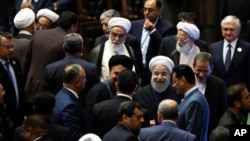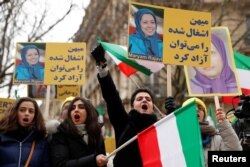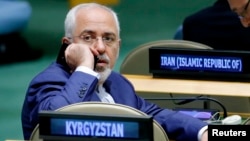Iran’s parliament is set to hold a special session as soon as Sunday to discuss the anti-government protests that began Dec. 28 and continued through this week.
Iran’s ISNA news agency reported that Iran’s interior minister, head of intelligence and security council chief are all expected to attend. On the agenda are discussions of the root cause of the protests, as well as legal help for protesters jailed during the demonstrations.
The session was called by a group of reformist lawmakers, according to Radio Free Europe/Radio Liberty. In a letter, those lawmakers called for legal assistance for the detained and condemned any outside “interference” in the protests, calling out the United States in particular.
U.S. President Donald Trump is set to decide next week whether to continue waiving sanctions on Iran that were suspended under the 2015 international deal on Iran’s nuclear program. The waiver must be renewed every 120 days, according to U.S. law. Trump could decide not to renew, putting U.S. trade sanctions back into effect.
In Europe, supporters of the anti-government protesters in Iran have been gathering to show their support in The Hague, Berlin, Hamburg, Stockholm, London and Paris.
At least 22 people have died in the protests, and more than 1,000 have been arrested. Hard-line cleric Ahmad Khatami told worshippers in a sermon Friday that those arrested should be treated as enemies of Islam, particularly those who have burned the flag.
“There should be no mercy for them,” he said.
Government official Mansour Gholami has told reporters that about a quarter of those arrested have been released, but he did not provide exact numbers.
UN Security Council
The United Nations Security Council held an emergency meeting Friday at the urging of the United States.
U.S. Ambassador to the U.N. Nikki Haley called the protests “a powerful exhibition of brave people who have become so fed up with their oppressive government that they are willing to risk their lives in protests.” She also addressed the Iranian government, saying, “the U.S. is watching what you do.”
In response, the Iranian ambassador, Gholamali Khoshroo, said it is a “discredit” to the Security Council to hold such a meeting on Iran in the face of the conflicts taking place in Yemen and elsewhere in the Middle East. He, along with a number of Security Council members, said the United States is meddling in Iran’s domestic affairs.
After the meeting, Iranian Foreign Minister Mohammad Javad Zarif tweeted, “The UNSC rebuffed the U.S.’s naked attempt to hijack its mandate. ... Another FP (foreign policy) blunder for the Trump administration.”
Still, U.S. intelligence officials warn Tehran is at a crossroads, noting the protests are the biggest outpouring of public discontent since Iranians took to the streets in 2009 following a disputed presidential election.
“The protests are symptomatic of long-standing grievances that have been left to fester,” an intelligence official told VOA on condition of anonymity. “Will it address the legitimate concerns of its people or suppress the voices of its own populace?”
“What is clear is that these concerns are not going away,” the official said.
Critics of Iranian President Hassan Rouhani say he has abandoned the poor, pointing to rising prices for key commodities like fuel, bread and eggs.







